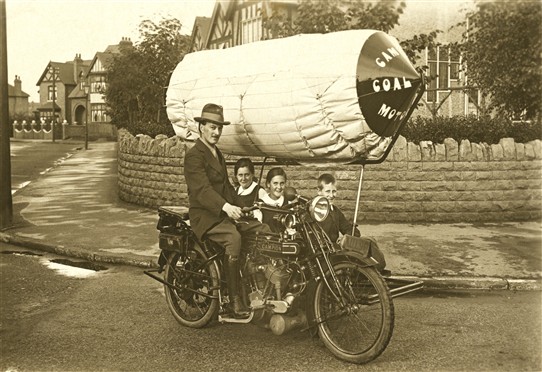Page 2 of 4
Re: Faster than fossil
Posted: Wed Jan 28, 2015 2:08 pm
by gn2
A hydrogen fuel cell bike could be viable in time, the technology is in its infancy just now, who knows what the future will be.
Maybe the bike just needs less battery and more fuel cell?
As various bus projects have already shown, its a balancing act getting the components right in the powertrain.
The A330 Fuel cell bus has a 120kw fuel cell and 2 x 85kw traction motors.
The fuel cell buses are connected to a shore supply overnight to keep the fuel cell coolant temperature within its operating range.
In service they get fuelled daily, same as a diesel bus.
Re: Faster than fossil
Posted: Wed Jan 28, 2015 4:27 pm
by Bluebottle
Both vehicle technologies are in their infancy.
The principle for the Hydrogen fuel cell has been around since 1801, working cells since 1830's. In the '50s companies were showing off farm tractors and golf buggy prototypes - so it isn't something that just arrived. It has had a similar gestation to electric vehicles.
It's true, we don't know what is in the future for hydrogen. But we don't know what is in the future for electric either.
We do know that in the present there are production electric bikes but no production hydrogen ones.
One infant seems to be walking and talking long before the other
Re: Faster than fossil
Posted: Wed Jan 28, 2015 5:41 pm
by Bluebottle
To match the BMW C Evolution would need at least 64 hydrogen cells.
Not worked out the size of the gas tank yet.

Don't know if it is useful but as far as I know a H fuel cell produces 0.5 to 0.7 volts. They are stacked to produce a more useable voltage
Re: Faster than fossil
Posted: Wed Jan 28, 2015 7:59 pm
by gn2
Don't see how a 1916 coal gas fuelled internal combustion motorbike is relevant to 2015 hydrogen fuel cell tech...?
Re: Faster than fossil
Posted: Wed Jan 28, 2015 8:33 pm
by Bluebottle
I thought it would make people smile.
It's a funny pic of a big gas bag on a bike
What I was wondering was - what would a fuel cell bike need to match the BMW or my own bike? but information is conflicting and hard to come by.
It should be possible to roughly work out the number of cells and the size of each, the gas required etc.
The only person I've spoken to that is in olved said that each machine will cost more than 10k more than the equivalent electric but they will sell them at a loss.
Re: Faster than fossil
Posted: Wed Jan 28, 2015 10:20 pm
by gn2
Initially the price differential could be more than that if the cost of the buses is anything to go by.
Re: Faster than fossil
Posted: Wed Jan 28, 2015 10:39 pm
by Bluebottle
Yes, they were talking about after mass production/volume savings so i'd go along with that but I don't know exactly what technology/catalysts they were using
I'm interested in finding out more but they don't make any direct comparisons or provide data that would allow it
Re: Faster than fossil
Posted: Thu Jan 29, 2015 12:23 am
by gn2
Here's a lot of info in the public domain regarding the various bus projects, probably because of government/public funding.
Re: Faster than fossil
Posted: Thu Jan 29, 2015 12:33 am
by Gerard C
Just saying how interesting this topic is. Some very good thinking. Oh and I found the old picture amusing.
Re: Faster than fossil
Posted: Thu Jan 29, 2015 12:11 pm
by michaelphillips
good old boris

is fighting hard to meet the euro emissions for london

watching topgear other night and they showed a graph of daily massive emissions etc yet on the bus strike day it halved the norm..
my thoughts its going to be electric with all there head start they have had, and new tech coming through, simples has to be the way without over doing the scooter, so its viable to purchase for everybody. the gogoro would work if the network was in place. LPG would have flopped long ago if BP had not put it into a lot of there petrol stations.in a few years when they have sorted the Polymer exchange membrane fuel cell (PEMFC)
this is a good read it starts on page 3 but just go to page one if you want to read it all
http://auto.howstuffworks.com/fuel-effi ... -cell2.htm
